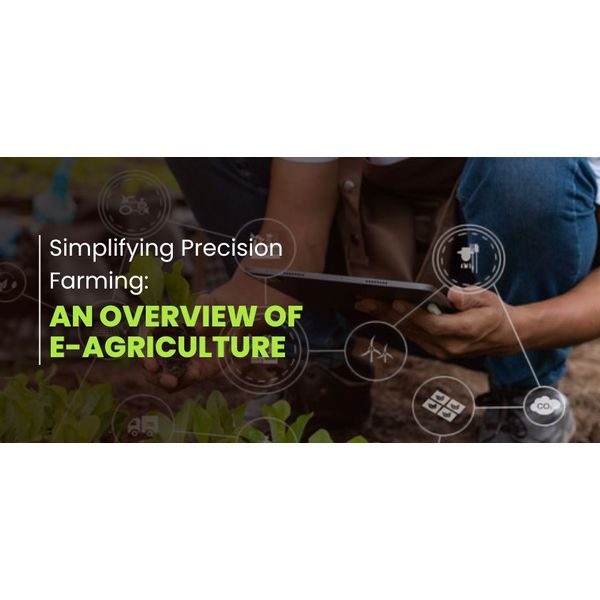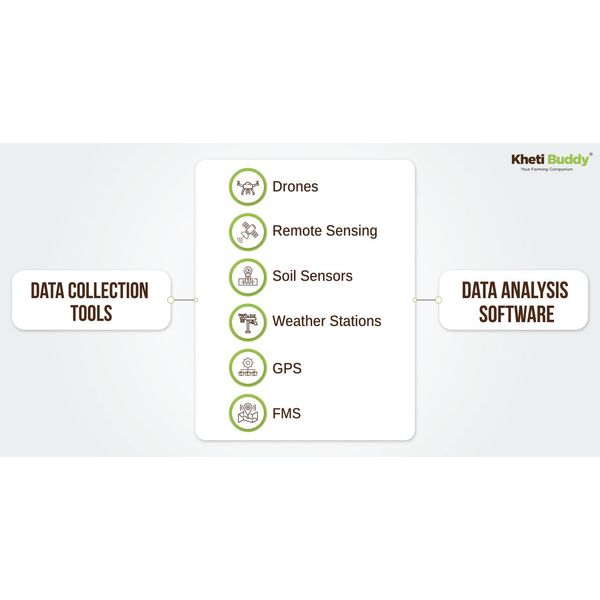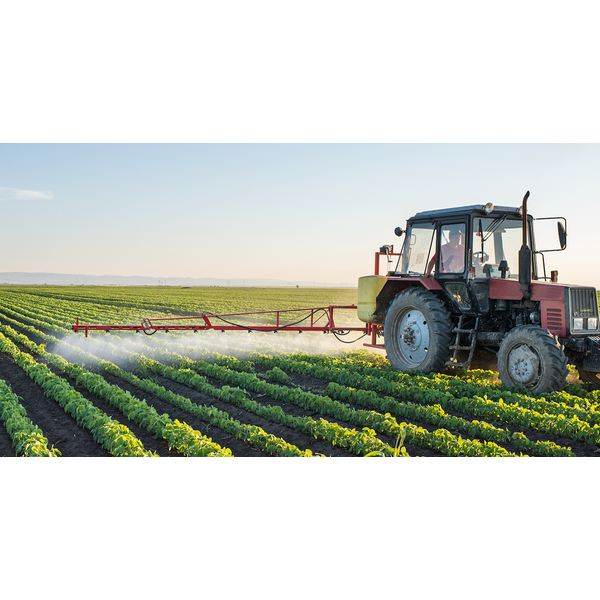

- Home
- Companies
- Kheti Buddy
- Articles
- Simplifying Precision Farming: An ...
Simplifying Precision Farming: An Overview of E-Agriculture
Precision agriculture is a revolutionary approach that leverages technology to optimize farming practices. Precision agriculture systems offer a modern solution to these age-old problems, enabling farms to enhance productivity, reduce waste, and improve sustainability.

This farm management concept uses advanced technologies to measure and respond to crop variability. Unlike traditional methods, precision agriculture focuses on detailed, data-driven insights to optimize field-level crop farming management.
This approach has evolved from basic yield monitoring to sophisticated systems involving remote sensing, GPS, and data analytics. The primary benefits of precision agriculture systems include increased efficiency, higher crop yields, reduced environmental impact, and improved profitability for the farms.
Data Collection Tools
Data collection is a critical component of precision agriculture. It uses IoTs and other systems to collect on-field and real-time crop data. Below are some examples of the technologies used for data collection:
1. Drones
Drones capture high-resolution images of entire farms, helping to identify variations across the fields such as water stress, disease outbreaks, and irrigation efficiency. They also provide an overview of canopy cover, weed penetration, and biomass index. This helps with targeted interventions.
2. Remote Sensing
Remote sensing captures images of geotagged farms using satellites, providing data including vegetative indices, NDVI maps, EVI maps, chlorophyll content, and phenology for crop growth stages. This helps with targeted interventions, monitoring crop health, and forecasting.
- NDVI Maps: Normalized Difference Vegetation Index maps indicate the health of vegetation.
- EVI Maps: Enhanced Vegetation Index maps provide a more accurate representation of plant health in areas with dense vegetation.
- Chlorophyll Content: Measures the amount of chlorophyll in plants, indicating their health and productivity.
- Phenology: The analysis of cyclic and seasonal natural phenomena, especially in relation to climate and plant and animal life.
3. Soil Sensors
Soil sensors collect real-time data on soil moisture, temperature, and nutrient levels, allowing for precise adjustments to water and fertilizer requirements.
4. Weather Stations
Weather stations collect data such as rain precipitation, humidity, wind speed, leaf wetness, evapotranspiration rate, barometric pressure, and more, along with a 7-day forecast. This helps with crop planning and proactive pest and disease management.
5. GPS
GPS technology captures various types of data crucial for precision farming, including equipment data, fuel consumption, elevation, and more. It helps optimize routes, yield mapping, and variable rate application, leading to improved precision and productivity.
6. Farm Management Software
On-field data like crop history, plantation details, farm details, and soil analysis are collected via a mobile application. This data is then used to streamline farm operations and decision-making processes.
Now that we have understood the different tools for collecting data, let’s explore how we can better understand the data and get actionable insights.

Once data is collected, it must be analyzed to provide actionable insights. Various aggregation and processing models and AI/ML algorithms are used to clean and process the data in order to generate actionable insights to optimize farm operations.
Actionable insights include pest & disease alerts, Nutrient deficiency indicators, Irrigation notifications along with irrigation timings, yield estimations, status on crop growth stages, fertilizer application rates, equipment usage alerts, daily farm activities notifications, etc.
The insights are based on the detail analysis of the data in combinations to build in precision leading to minimize use of resources while maximizing productivity.
High-precision farming techniques leverage detailed data and cutting-edge technologies to optimize various aspects of crop production.
Soil Management and Optimization
Soil management is fundamental to high-precision farming. By analyzing soil data, agronomist can adjust their practices to improve soil health and fertility. Techniques such as variable rate fertilization ensure that nutrients are applied where they are needed most, enhancing plant growth and reducing the risk of over-fertilization.
Crop Monitoring and Health Assessment
Continuous crop monitoring is essential for identifying issues early and addressing them promptly. Drones fitted with multispectral cameras can capture images that reveal crop stress, disease, and pest infestations. This real-time monitoring allows for targeted interventions, reducing the spread of diseases and minimizing crop loss.
Water Management and Irrigation Systems
Efficient water use is a cornerstone of sustainable farming. Precision irrigation systems use soil moisture sensors and weather data to define the optimal watering schedule and amount. This approach ensures that crops receive the right amount of water at the right time, reducing water waste and improving crop health.
Pest and Disease Management
Precision agriculture tools enable proactive pest and disease management. By using predictive analytics and remote sensing data, agronomists can anticipate pest outbreaks and take preventive measures. Targeted pesticide application minimizes chemical use and environmental impact while effectively controlling pests.
The adoption of high-precision farming techniques offers numerous benefits for agronomists and the environment.
Increased Crop Yields and Productivity
Precision agriculture enables agronomist to optimize their practices, leading to higher crop yields and better productivity. By addressing the specific needs of each area of the field, agronomists can enhance plant health and growth, resulting in more abundant harvests.
Resource Efficiency and Cost Savings
Targeted application of inputs such as seeds, fertilizers, and water reduces waste and lowers production costs. Precision agriculture systems ensure that resources are used efficiently, leading to significant cost savings for agronomists.
Reduced Chemical Use
By minimizing the use of chemicals and optimizing resource use, precision agriculture contributes to environmental sustainability. Reduced chemical application lowers the risk of soil and water contamination, protecting ecosystems and biodiversity.
Enhanced Farm Management and Planning
Precision agriculture provides agronomist with detailed insights and data-driven recommendations, enhancing their ability to manage and plan their operations effectively. This improved management leads to better decision-making and increased resilience to challenges such as climate change and market fluctuations.
Smart precision farming represents the next evolution in agricultural technology, integrating advanced technologies such as big data, and robotics to create highly automated and efficient farming systems.

Big Data and Cloud Computing
Big data and cloud computing play a crucial role in smart precision farming. By analyzing vast amounts of data from various sources, farm supervisors can gain deeper insights into their operations. Cloud-based platforms enable easy access to data and analytics tools, facilitating informed decision-making. Predictive analytics helps to forecast crop yields, optimize planting schedules, and manage resources more efficiently.
Autonomous Farming Equipment and Robotics
Automation and robotics are revolutionizing farming practices. Autonomous tractors, harvesters, and drones perform tasks with precision and efficiency, reducing manual labor. Robots can also be used for tasks such as planting, weeding, and harvesting, further enhancing productivity and reducing operational costs.
Predictive Analytics for Improved Decision-Making
This leverages historical data and machine learning algorithms to forecast future trends and outcomes. In agriculture, this means better planning and resource allocation. An agronomist can predict crop yields, identify potential risks, and optimize their practices to maximize profitability and sustainability.
Precision agriculture systems represent a transformative approach to modern farming, offering solutions to many of the challenges faced by traditional agriculture. This is where Ag-tech platforms play a crucial role. They unify all the various data points in one place and further analyze them to provide data-driven agronomical insights. These insights enhance and facilitate precision farming practices.
For expert guidance and support, contact KhetiBuddy. We are ready to help you implement the latest precision farming technologies and optimize your agricultural practices. Reach out to KhetiBuddy today and take the first step towards a more efficient and sustainable farm.
